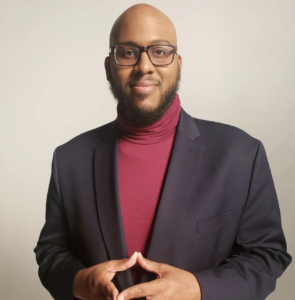
Community with Jason Craige Harris: A TKS Conversations
At TKS, students receive training as actors to portray roles that showcase the intricacies of human relationships, exposing both the challenges and potential for community.

Jason Craige Harris is a consultant who specializes in community, culture, and diversity, equity, and inclusion (DEI). He has a strong interest in studying and enhancing human relationships, which form the foundation for fostering belonging and inclusion at Terry Knickerbocker Studio.
TKS: How do you define your role as a consultant on community, culture, and DEI?
Jason: I begin by thinking about relationships as the bedrock of human life – how we relate to each other, see each other, hear and value each other. Humans are social creatures and are inclined to create and maintain community and also to diminish and destroy community. How we understand and respond to those inclinations defines us and our communities.
Community consists of a collection of relationships. Culture is a series of behaviors, thought patterns, and stories that influence and shape community. DEI – Diversity, Equity and Inclusion– are core values that should shape our community and our culture.
TKS: Why are you fascinated with exploring those qualities at the Terry Knickerbocker Studio?
Jason: I view actors as having unique skills that provide tailored access to the empathic imagination – the ability to inhabit stories that are not their own and to use their bodies and voices to fill out life worlds. That’s an incredible resource. It enables actors to reveal the nature of human relations – and the messiness and possibilities of community.
Exploring community, culture, and DEI within the Terry Knickerbocker Studio, therefore, offers a chance to do that within a school that trains people to enhance their craft of representing the depths of the human experience and human relationships across differences – and that is at the heart of the Studio’s commitment to inclusion. Since exploring human relationships is fundamental to acting, the Terry Knickerbocker Studio needs to be an incubator where acting students can encounter an enriching community experience. To make the greatest difference in the world through their craft, they must first encounter true community in their training.
TKS: You clearly see actors as agents of change.
Jason: Research suggests that under the right conditions indirect contact with stories and identities that are not your own can be powerful empathy producers and can reduce biases. That’s why the actor’s role in providing contact with those stories and identities is so vital. But we need those stories to be shared far more broadly through the creation of “oasis communities” in all aspects of our social landscape. We can spend our time decrying the actions that have disfigured American life, or we can build counter-cultures that center core values. Those oasis communities can multiple over time and eventually tip the balance and take over the culture.
TKS: What constitutes an “oasis community”?
Jason: There are three key steps to building an oasis community: The first is building positive relationships within and across lines of difference, and most of our time should be spent on that. The second step is maintaining those positive relationships – not ignoring problems but addressing them, so that problems don’t grow. The third is repairing relationships that have fallen into conflict or harm. If we do well enough at building and maintaining relationships, there will be much less to repair.
TKS: How have you been building an “oasis community” at the Terry Knickerbocker Studio?
Jason: My work is a mix of assessments, protocols, training, and advice. I’ve worked closely, for instance, with faculty, staff, students, and alumni to assess the culture and climate of the Studio. I conducted one-on-one interviews with staff members as well as focus groups with faculty, students, and alumni. I then analyzed the resulting data and made recommendations. I also did a critical analysis of the Studio’s digital and print media, its admissions process, and its course catalog and curriculum. I helped the Studio to set up a bias incident response protocol, which provides a formal way to address any incidents that might arise. I trained the people who will implement the protocol going forward. I also trained the faculty in inclusive practices, and I advise the Studio’s leadership on an ongoing basis. The entire process is appropriately unfinished – this work is about the journey, not the destination.
TKS: In this conversation, you’ve described multiple dimensions of the Studio’s role in building community, culture, and DEI.
Jason: Absolutely, the Terry Knickerbocker Studio is training actors to enhance their craft in service of exploring and portraying complex human emotions and experiences. It is, therefore, creating agents of change, who can help build a more inclusive society. The Studio is also building an oasis community that can shape the experience of its students, as they refine their craft. In addition, the Studio is working to diversify the acting profession, ensuring that more people from underrepresented backgrounds can join this incredible field.
The Terry Knickerbocker Studio has managed to bring together people from various walks of life – from near and far – to engage in the collective work of representing the human story. In that regard, the level of vulnerability, courage, commitment, and openness that has come to characterize the participants in the Studio is extraordinary. I have been especially struck by the deep respect, love, and care that folks share with each other. That starts with Terry Knickerbocker, who leads by example. He never expects others to do something that he’s unwilling to do. He models a deep commitment to vulnerability, accountability, and growth. Vulnerability is also essential to the Meissner technique, which requires lasting self-exploration and self-awareness. Those qualities are vital both to acting and to building community – two goals that are intertwined and that together have enormous restorative potential for our nation and our world.
ADDITIONAL RESOURCES:
Jason Craige Harris – LinkedIn
Terry Knickerbocker Studio’s DEIB Statement